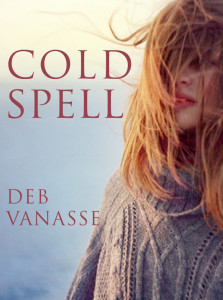Alaskan author Deb Vanasse shares her personal experience and learning curve of becoming a hybrid author, with books both self-published and traditionally published. Like Hugh Howey, she suspects being hybrid offers the best of both worlds.
“Say you keep the electronic rights,” my publisher said. “What are you going to do with them?
I had no idea.
The year was 2004, and while the buzz among authors was that you should try to hold onto your e-rights if you could, I was among those—the majority, I suspect—who had not a clue as to what that really meant.
Flash forward ten years.
While I’d signed away those particular e-rights, I recovered all rights for two other books that had gone out of print (back when such a thing was still possible) and have brought them back into print on my own, as e-books and with print-on-demand (POD) print editions.
Now I’m a hybrid author, publishing both traditionally and independently. And I even have a hybrid book, one for which the rights are divvied up between a traditional publisher and me. The publisher has English language print rights. With their reputation and distribution network, the softcover of my latest novel, Cold Spell, is showing up all over, especially after reviews came in from places that would have punted it right out the door had the book been entirely self-published: Publishers Weekly, Booklist, and Foreword Reviews (though the latter does feature indie books, Cold Spell was a selected rather than paid review)
As for the rest of the rights—digital, audio, foreign—I’m working those in ways the print publisher can’t; they simply don’t have the resources.
- For the e-book, I run giveaways and specials
- The audiobook is in production with a well-known radio host
- Worldwide, a go-getter agent is representing the translation rights on my behalf
Like so much else in publishing these days, the hybrid book is an experiment, one that works with the right combination of publisher, author, and book. Publishers want authors to sign over all rights; that’s how they do business. If you want to propose a different arrangement, you need to bring something special to the table—ideally, a book that the publisher couldn’t otherwise get. With large crossover potential—it's literary, and it's women's fiction, with book club appeal—I knew a well-marketed digital edition of Cold Spell would find its way to readers who might never consider picking up the softcover from the university press that holds the English language print rights. More readers mean more buzz, which means more sales in both digital and print, a win-win for the publisher and me.
The Small Press Advantage: Flexibility
 There’s no way a Big Five Publisher would negotiate a hybrid arrangement with a small-time author. But in a changing market, small presses have the advantage of being nimble and forward-thinking. Some will understand this and use it to their advantage: those are the publishers you want to approach if you think you and your book are right for a hybrid deal. It also helps to have a previous working relationship; in my case, I’d done two prior books with the press.
There’s no way a Big Five Publisher would negotiate a hybrid arrangement with a small-time author. But in a changing market, small presses have the advantage of being nimble and forward-thinking. Some will understand this and use it to their advantage: those are the publishers you want to approach if you think you and your book are right for a hybrid deal. It also helps to have a previous working relationship; in my case, I’d done two prior books with the press.
And this time, when asked what I’d do with the rights I wanted to keep, I had a long and detailed answer. I had proof that I knew what I was doing, and I shared particulars about how I’d promote the non-print editions, and how that would mean a greater return for the publisher on the print edition, to offset the potential revenue lost from sales of the ebook.
If you propose a hybrid deal, keep in mind the publisher’s investment in bringing your book to market. Your book will benefit from the efforts of professional editors, proofreaders, and designers. Expect to generate your own digital files. Discuss contract language to ensure that the content of the book is the same in all editions. Decide whether cover files will be shared.
Sales figures will tell the full story, but so far, everyone’s benefiting from the hybrid arrangement for Cold Spell. The book is getting far more exposure that it would have under a traditional arrangement, and readers are enjoying access to the book (at competitive prices) in editions that wouldn’t otherwise have been made.
After thirteen previous books in print, I’ve finally got an answer: yes, I know what to do with those rights.
OVER TO YOU
Do you have hybrid experience? Are you indie craving a traditional deal? Trade-published craving the independence offered by self-publishing? Please feel free to continue the conversation via the comments box.
“Is being a hybrid author the best of both worlds? @DebVanasse reports from #Alaska via @IndieAuthorALLi: https://selfpublishingadvice.org/hybrid/”







[…] What Are the Benefits of Being a Hybrid Author? – by Deb Vanasse […]
[…] Lotter presents Publishing: What are the Benefits of Being a Hybrid Author? posted at An Animated Approach to Cover Design, saying, “I have taken this over as I see we […]
Thank you for sharing your experiences. It’s certainly an option to consider. It’s not always “either or”. It’s great that authors are willing to post blogs like this one and outline what they might have done differently, paving the way for authors just starting out!
I blogged the term ‘hybrid author’ back in 2011. Now apparently it’s part of the lexicon. Interesting.
I’m jealous, Bob. Always wanted to coin a new term and have it catch on…
🙂
Sounds fantastic! Please do. And we’d love you to be the Alliance’s “front woman” in Alaska, if that’s a role that appeals, drop me a line. Thanks so much for your great post! x
Thanks, Orna. Love the idea of “hybrid” soon ceding to a new (and better!) era in publishing in which authors hold digital rights and print joins the subsidiary rights. I worked on a fun alliance project this spring (the Alaska Sampler 2014) in which indie authors partnered with indie bookstores on an e-book. Might be a great topic for a future post; I’ll check with Debbie on that.
Great story Deb and well done! We hear a lot about these print deals at the big end of the spectrum but I agree with you that the potential for most authors is with smaller publishers. An alliance between indie authors, indie bookstores and indie publishers is, I believe, the way forward for all and at ALLi, we are actively promoting – through our Open Up to Into Author’s campaign — the changes that are necessary to make it happen on a wider scale. Actually, I’d go so far as to say that the idea of “hybrid” is almost over — this is just what author-publishing looks like when we begin with digital and treat print as a subsidiary right. Thanks for a great post and keep us posted (pun intended) 🙂